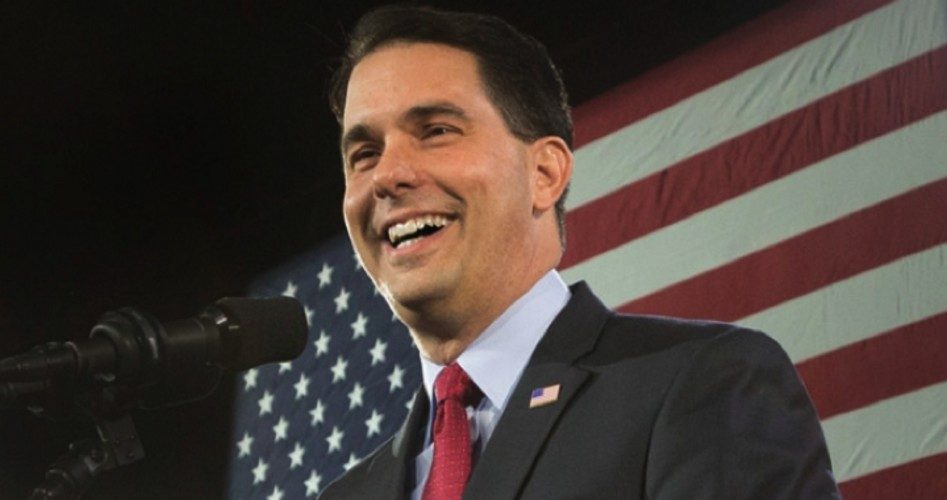
On Tuesday, as part of his continuing quest to bring Wisconsin’s government spending under control, Governor Scott Walker (shown) announced a 13-percent cut to the University of Wisconsin’s $2.3 billion annual budget. In addition, his plan includes a two-year tuition freeze and the severance of state control over the university, passing it over to an autonomous authority. It also includes drug testing for people applying for public assistance, the merging of several state agencies, and the elimination of 400 state jobs. Walker explained: “Our plan will use common-sense reforms to create a government that is limited in scope and ultimately more effective, more efficient and more accountable.”
He also made clear in a radio interview that professors are going to have to ante up as well:
Maybe it’s time for faculty and staff to start thinking about teaching more classes and doing more work. This [new] authority frees up the UW administration to make those sorts of requests, which I think we need not only here but across the country.
This is a double-barreled announcement that not only reflects Walker’s determination to get state spending under control but also prods observers to conclude that since it’s working in Wisconsin, it certainly could in Washington, D.C., as well.
It turns out that UW Chancellor Rebecca Blank has been cutting course hours for her professors in order to keep them from taking more lucrative positions elsewhere, paying them the same but for less work. Walker thinks that must change in order for the UW to operate under the new austerity.
Walker also clearly has his eye on another target: the White House. He just announced a new political entity called “Our American Revival,” a group of high-powered and experienced politicos to help him get there. Running the show will be Kirsten Kukowski, former communications director and press secretary for the Republican National Committee, along with Mark Stephenson, who headed up Joni Ernst’s successful bid for the Senate in Iowa.
Walker also helped himself to some top people at the Tarrance Group, a finely tuned political machine founded by V. Lance Tarrance, the author of How Republicans Can Win in a Changing America. In his book Tarrance outlines 15 key characteristics a successful candidate must have in the new political climate, and Walker has most of them, the key one being courage.
When Walker won the gubernatorial contest in Wisconsin in 2010 the state was facing more than a $300 million shortfall in its budget. Required under the state constitution to have a balanced budget, Walker offered his plan, called the “Wisconsin Budget Repair Bill,” just three weeks after his inauguration in January 2011: It centered on reducing union bargaining power over pay and requiring to pay eight percent more for their retirement and health benefits. It also cut taxes for small business owners and on those in the highest tax brackets along with cutting capital gains taxes. In a blue state that went for Obama in 2008 (and would do so again in 2012), these were fighting words.
Within months a recall effort was well underway, which garnered national attention and generated personal attacks and death threats on Walker’s life. In June 2012, he faced the same opponent from his 2010 campaign: Milwaukee Mayor Tom Barrett, whom he had defeated 52-48 percent. Walker survived the recall election with a slightly higher margin, 53-47 percent, the first time a sitting governor had ever survived a recall election in history.
His running mate and now Lieutenant Governor Rebecca Kleefisch, explained why Barrett never had a chance:
We came into office with a $362 million deficit. In the last two years we’ve had back-to-back surpluses, and this year the surplus will be $911 million.
We’ve overseen $405 million in property tax relief and as a result of changing the withholding policy of our taxes, $67 a month will be coming back in [citizens’] paychecks beginning in April.
Furthermore, unemployment in Wisconsin has dropped precipitously during Walker’s terms, from 9.2 percent in 2011 to 6.1 percent in 2013, thanks in part to the 100,000 new jobs the state’s economy has generated over the same period of time.
Walker’s reelection was helped along by his book Unintimidated, published last August, in which he details the struggles, challenges, and threats involved in dismantling the union structure that put Wisconsin into the red. In his preface, Walker wrote:
Today we can sound like conservatives and act like conservatives — and still win elections. Those who say we can’t don’t see what I see in Wisconsin and what my fellow governors in states all across America see: we don’t need to change our principles. What we need is more courage!
Walker’s claim that it takes guts and conviction and determination to win was enthusiastically received in Iowa where he took 15 percent of the Des Moines Register/Bloomberg Politics Iowa Poll on January 31, beating out Senator Rand Paul.
Walker’s latest bid to bring financial stability to Wisconsin, this time by cutting university spending, is also a bid for the White House. If reducing government spending works in Wisconsin, there’s no reason why it wouldn’t work in Washington, D.C. where it is even more desperately needed.
A graduate of an Ivy League school and a former investment advisor, Bob is a regular contributor to The New American magazine and blogs frequently at www.LightFromTheRight.com, primarily on economics and politics.

